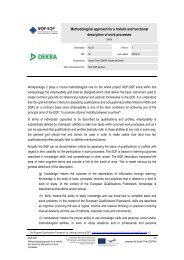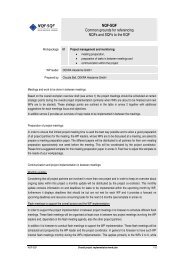Overview of National Qualification frameworks - Project-Nqf-Sqf
Overview of National Qualification frameworks - Project-Nqf-Sqf
Overview of National Qualification frameworks - Project-Nqf-Sqf
Create successful ePaper yourself
Turn your PDF publications into a flip-book with our unique Google optimized e-Paper software.
__Level 4: Competence in a wide range <strong>of</strong> complex pr<strong>of</strong>essional activities carried out in a wide variety <strong>of</strong> contexts and whichrequire connecting variables <strong>of</strong> a technical, scientific, economic or organizational nature in order to plan courses and to defineor develop projects, processes, products or services.__Level 5:Competence in a wide range <strong>of</strong> pr<strong>of</strong>essional activities <strong>of</strong> great complexity carried out in a variety <strong>of</strong> contexts whichare <strong>of</strong>ten unpredictable and involve planning courses or ideas for products, processes or services. Very self sufficient. Frequentresponsibility in delegating resources, analysis, diagnostic, design, planning, task completion and assessment.But since 2002 a new classification is used for Higher Education with the 3 levels linked to degrees (in French Licence, masterDoctorat) which are integrated to this grid. A project <strong>of</strong> a new integrative grid is in progress actually to be applied to the wholeNQF.In France the NQF features 5 levels:Table 1Levels <strong>of</strong> the French NQFLEVELS DEFINITIONS COMMENTSVStaff occupying jobs normally requiring a level <strong>of</strong>training equivalent to that <strong>of</strong> brevet d'étudespr<strong>of</strong>essionnelles (BEP) or that <strong>of</strong> certificate d’aptitudepr<strong>of</strong>essionnelle (CAP), and that <strong>of</strong> certificat deformation pr<strong>of</strong>essionnelle des adultes (CFPA) (CFPA)<strong>of</strong> first degree .This level corresponds to a full qualification for the exercise<strong>of</strong> a well-defined occupation with the ability to useinstruments and related technology. This activity is mainly awork <strong>of</strong> performance which can be autonomous within thelimits <strong>of</strong> the techniques which are linked to it.IVStaff occupying jobs <strong>of</strong> control or highly skilled workerwho can attest to a level equivalent to that <strong>of</strong> theBrevet Pr<strong>of</strong>essional (BP), the brevet de technicien(BT), the bachelor's degree (general or technologic)<strong>Qualification</strong> level IV requires more knowledge than theprevious level. This activity involves mainly technical workwhich can be executed independently and / or the worker canhave supervisory responsibilities (control) and coordinationreponsabilitiesIIIStaff occupying jobs that normally require the level <strong>of</strong>training <strong>of</strong> diploma <strong>of</strong> University Institutes <strong>of</strong>Technology (DUT) or brevet de technicien supérieur(BTS) or end <strong>of</strong> first cycle higher education.<strong>Qualification</strong> Level III corresponds to the knowledge andability <strong>of</strong> a higher level, without including the knowledgelinked to the foundations <strong>of</strong> the scientific fields. The requiredskills and knowledge allow to ensure the responsibilities <strong>of</strong>design and / or supervision and / or management, withautonomy and independenceIIIStaff occupying jobs normally requiring a levelcomparable to that <strong>of</strong> a “licence” or “maitrise”Staff occupying jobs normally requiring a better levelthan the one concerning the “maitrise”.This level <strong>of</strong> qualification involves the scientific foundations <strong>of</strong>the pr<strong>of</strong>ession, generally leading to autonomy in the exercise<strong>of</strong> this occupationIn addition to a stated knowledge <strong>of</strong> the scientific basis <strong>of</strong> anoccupation, qualification level I requires the mastery <strong>of</strong>design or research processes.Source: CNCP (<strong>National</strong> commission for vocational certifications); (approuved decision from “permanent group for the vocational training and social promotion”(1969, march 21 st)In Italy the structures <strong>of</strong> the NQF levels and level descriptors have not yet been defined, although there are components inplace, e.g. in HE and more recently at upper secondary level. Italy uses a learning outcomes approach and the EQF leveldescriptors as a basis for further developments. The national coordination point is currently working on this topic.1.2 NQF typologySpeaking about the typology <strong>of</strong> the NQFs, coordination <strong>of</strong> the existing system is the aim in Austria, the Netherlands and Italy. Afurther regulation <strong>of</strong> the existing system is targeted in Greece, while transforming the systems seems to be the focus inNQF-SQF:"This project has been funded with support from4/5<strong>Overview</strong> <strong>of</strong> <strong>National</strong> <strong>Qualification</strong>prepared by 3s research laboratory<strong>frameworks</strong>the European Commission. This publicationreflects the views only <strong>of</strong> the author, and theCommission cannot be held responsible for anyuse which may be made <strong>of</strong> the informationcontained therein."




